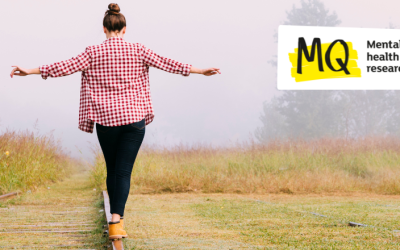Karim Mitha’s research focusses on the mental health of people in ethnic communities – and how culture, marginalisation and identity all play a part in their experience of mental illness. He joins us to dig a little deeper into these factors – and shares his hopes for smashing stigma.
How long have you been in this field of research, and what about it interests you?
My background is in psychology, so I’ve always been interested in people’s behaviour. I’m also Muslim and have often wondered why we didn’t talk about issues like mental illness as a community.
While the issues I see within my own community are echoed across all sorts of groups and communities in wider society, my research looks at aspects of acculturation, identity, and "acculturative stress". That means considering what happens when ethnic communities migrate to a new place - and how a new setting can impact a person’s sense of identity. Within different cultures and religions, there are also different ways of understanding things that happen – particularly mental illness.
Why do you think research is needed in this area?
We know mental illness affects millions of people in the UK. Faith communities are no exception. But let’s look for example at the Muslim community– there are additional factors such as internal social pressures, Islamophobia, discrimination and identity which means their experiences of mental health may be different. I think that warrants attention.
Similarly to wider society, there’s a taboo surrounding mental health – people often grow up seeing mental illness as shameful. Within Muslim communities, there are pressures of societal/community expectations - for instance, if you or a family member has experienced mental illness it might affect your marriage prospects. Additionally, mental illness is sometimes talked about superstitiously, for example someone putting an evil eye on you or saying you’re possessed. This discourse also occurs in other cultural/faith communities, so understanding the "cultural formulation" is really important in addressing mental illness cross-culturally.
Does this stop people in these communities seeking help?
Certainly. Saving face and community honour is a significant reason people don’t seek help. But it’s also deep-rooted in identity.
As a migrant community moving to a new context, everything is different. So you hold on to identity markers of your culture to impart to the next generation – for example, attitudes around dress, social interaction, gender norms, use of mother tongue language, etc. This can also include beliefs about mental health. Holding onto this rigidly, without adapting to the new and changing culture around you, is known as ‘cultural fossilization’.
There’s also a question of the language around mental health – people whose first language isn’t English may not be familiar with this discourse. If their clinician says, ‘you have anxiety’, a person may not recognise what the term is. It's not enough to just do a literal translation of the word - a conceptual understanding is needed.
Our ambassador Asha has spoken about a lack of data preventing us from understand the extent of mental illness in these communities. Is this due to people not talking about it?
That is definitely a factor. But investment is a general problem for mental health research. The UK invests just 6% of the research budget on mental health, which is nowhere near high enough considering the number of people affected.
Within this limited budget, there’s little investment in research into racial and ethnic inequalities. It’s a niche area and there are questions why we should target certain groups when we could invest in broader research. However, BME communities make up a large percentage of the UK population and have distinct needs. We need to understand how to offer the right support for everyone, in every community.
So from existing data, what do we know?
In general, we know women are 2-3 times more likely to experience conditions such as depression and anxiety, whilst men are more likely to experience conditions such as schizophrenia or psychosis. These patterns are echoed across different ethnic groups.
But if you tease out the data, you’ll see differences. For example, suicide is forbidden in Islam, so we see fewer suicides - but this doesn't necessarily mean we see less self-harm. Social and environmental factors also play a strong role. BME communities are more likely to live in deprived areas and experience racism or discrimination. They’re less likely to have higher education outcomes or be in higher managerial positions. All these things factor into their experience of mental distress.
There are studies which suggest that people from BME backgrounds tend to present mental illness much later and at greater stages of severity. This is likely to be a combination of recognizing symptoms, the stigma within the community, and different conceptualisations and language surrounding their experience. We also know white British people are twice as likely to seek treatment than people from BME backgrounds.
Have you seen a generational shift in the way these communities are talking about mental health?
Yes. Within these communities, we now have a generation where young people are seeing posters asking, ‘Are you depressed?’ and recognising that they might feel that way. Yet those two worlds aren’t merging, they’re colliding. If a young person wants to seek help from their GP, they often feel they can’t tell their parents due to cultural norms, guilt and taboos.
Conversely, if we look at older generations, there may be practical barriers like transportation, interpretation, and the GP not understanding them if they don't use mainstream discourse. We need to recognise that we can't treat different generations within these communities homogeneously.
What is your current research looking at?
I'm currently looking at Muslims in Scotland and examining how the minority experience there impacts a person’s sense of self, in terms of resilience, integration and wellbeing. Scotland is not very ethnically diverse, yet politically sees itself as being very welcoming. But what is the experience on the ground? What does being ‘different’ mean and how does this impact people’s mental health?
I've been engaging with faith and community leaders, clinical practitioners who come from a Muslim background, and Muslims with lived experience. Literature suggests people often turn to their own community rather than a GP for fear they won’t be understood, so that's why I'm working with all these groups.
What other research is going on in the field?
Based on the idea that mainstream services don't always understand the perspective of people in these communities, there’s really interesting work adapting existing tools to provide culturally appropriate care.
For example, Ghazala Mir in Leeds is looking at religious-based cognitive behavioral therapy. This is marrying Western psychotherapy with religious analogies to talk about mental health and how we can treat it within a religious paradigm. For example, people may feel a sense of guilt that they are turning against their community if they choose to seek help - and may also be reluctant to take medication. This therapy uses teachings from the Quran to make a case for using medication and seeking help, employing analogies people are familiar with.
In 10 years’ time, what are your hopes for how mental health is perceived and treated in these communities?
I think we're already seeing progress – we talk about Time to Change and we have high-profile individuals like the Duke and Duchess of Cambridge, who are looked up to as role models, talking about their own experiences. This helps people understand that they aren’t alone and encourages them to approach clinicians.
I hope that 10 years down the line people recognize there are different ways of understanding mental illness – but that this experience is ultimately normal. From there, I hope we offer culturally appropriate services or acknowledge people’s needs – for example, if a person is Muslim, offering them a referral to a clinical psychologist who is Muslim and has an understanding of the wider issues.
We are seeing change in young people - they're far more willing to acknowledge their experiences. I think this is a very positive step.



